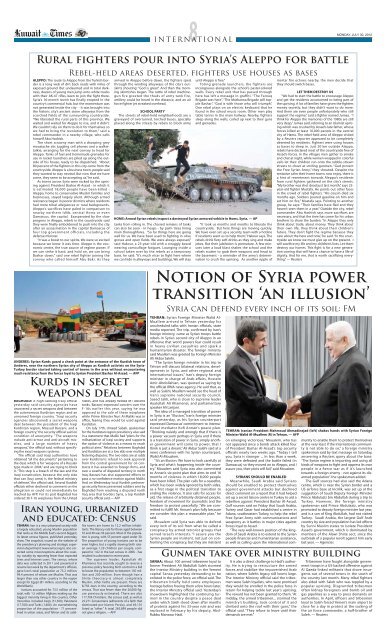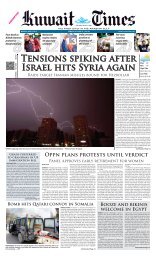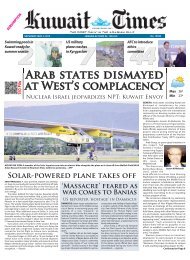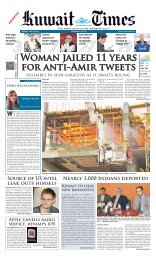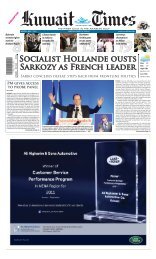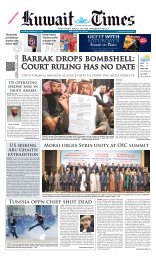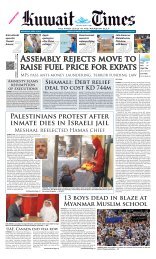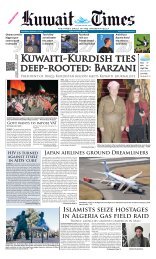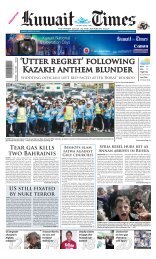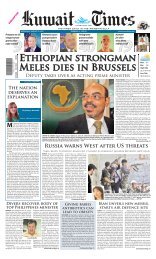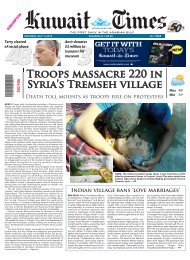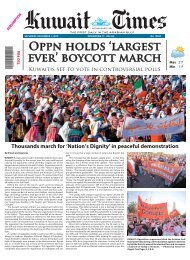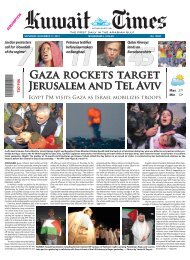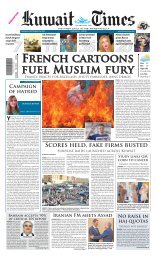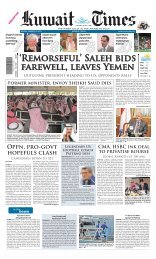UAE widENS cRAckdOwN; MORE ISlAMiStS ... - Kuwait Times
UAE widENS cRAckdOwN; MORE ISlAMiStS ... - Kuwait Times
UAE widENS cRAckdOwN; MORE ISlAMiStS ... - Kuwait Times
Create successful ePaper yourself
Turn your PDF publications into a flip-book with our unique Google optimized e-Paper software.
ALEPPO: The route to Aleppo from the Turkish border<br />
is a long web of dirt back roads with miles of<br />
exposed ground. But undaunted and in total darkness,<br />
dozens of young men jump onto white trucks<br />
with their AK-47 rifles, keen to join the fight there.<br />
Syria’s 16-month revolt has finally erupted in the<br />
country’s commercial hub, but the momentum was<br />
not generated inside the city - it was brought into<br />
the historic city’s ancient stone alleyways from the<br />
scorched fields of the surrounding countryside.<br />
“We liberated the rural parts of this province. We<br />
waited and waited for Aleppo to rise, and it didn’t.<br />
We couldn’t rely on them to do it for themselves so<br />
we had to bring the revolution to them,” said a<br />
rebel commander in a nearby village, who calls<br />
himself Abu Hashish.<br />
The short scrawny man with a drooping grey<br />
moustache sits juggling cell phones and a walkietalkie,<br />
arranging for the next convoy to head for<br />
Aleppo. Tanks of fuel and homemade grenades for<br />
use in rocket launchers are piled up along the outside<br />
of his house, ready to be dispatched. “About<br />
80 percent of the fighters in this city come from the<br />
countryside. Aleppo is a business town, people said<br />
they wanted to stay neutral. But now that we have<br />
come, they seem to be accepting us,” he said.<br />
As towns across Syria were rocked by the uprising<br />
against President Bashar Al-Assad - in which it<br />
is estimated 18,000 people have been killed -<br />
Aleppo, home to conservative Muslim families and<br />
businesses, stayed largely silent. Although armed<br />
resistance began in poorer districts where residents<br />
had more tribal allegiances or rural backgrounds,<br />
Aleppo’s sacrifices have paled in comparison to<br />
nearby northern Idlib, central Homs or even<br />
Damascus, the capital. Exasperated by the slow<br />
progress in Aleppo, rebels in the countryside said<br />
they were finally emboldened to push into the city<br />
after an assassination in the capital Damascus of<br />
four top government officials, including the<br />
defense minister.<br />
“It was a boost to our spirits. We were so excited<br />
because we knew it was time. Aleppo is the economic<br />
centre, the true source of regime power. If<br />
we can strike it hard, and hold on, we can bring<br />
Bashar down,” said one rebel fighter joining the<br />
convoy who called himself Abu Bakr. As they<br />
arrived in Aleppo before dawn, the fighters sped<br />
through the winding alleyways of the city’s outskirts<br />
shouting: “God is great”. And then the morning<br />
skirmishes began. The rattle of rebel machinegun<br />
fire greeted the thuds of army tank fire,<br />
artillery could be heard in the distance, and an air<br />
force fighter jet streaked overhead.<br />
SCHOOL PARTY<br />
The streets of rebel-held neighborhoods are a<br />
graveyard of overturned, torched buses, specially<br />
placed along the streets by rebels to block army<br />
tanks from rolling in. The charred remains of tanks<br />
can also be seen - in heaps - by palm trees lining<br />
main thoroughfares. “So far things here are going<br />
well for us. We have been used to fighting in olive<br />
groves and open fields. We were always exposed,”<br />
said Hakour, a 23-year-old with a straggly beard<br />
wearing camouflage fatigues. Lounging inside a<br />
school taken over by the rebels as a temporary<br />
base, he said: “It’s much nicer to fight here where<br />
we can hide in alleyways and buildings. We will stay<br />
INTERNATIONAL<br />
Rural fighters pour into Syria’s Aleppo for battle<br />
Rebel-held areas deserted, fighters use houses as bases<br />
JINDERES: Syrian Kurds guard a check point at the entrance of the Kurdish town of<br />
Jinderes, near the northern Syrian city of Aleppo as Kurdish activists on the Syria-<br />
Turkey border started taking control of towns in the area without encountering<br />
much resistance from the forces loyal to Syrian President Bashar Al-Assad. — AFP<br />
Kurds in secret<br />
weapons deal<br />
BAGHDAD: A high-ranking Iraqi official<br />
yesterday said security agencies have<br />
uncovered a secret weapons deal between<br />
the autonomous Kurdistan region and an<br />
unnamed foreign country. “Iraqi security<br />
agencies (discovered) a secret weapons<br />
deal between the president of the Iraqi<br />
Kurdistan region, Massud Barzani, and a<br />
foreign country,” the security official said on<br />
condition of anonymity. “The weapons<br />
include anti-armor and anti-aircraft missiles,<br />
and a large number of heavy<br />
weapons,” the official said, without specifying<br />
the exact weapons systems.<br />
The official said Iraqi authorities have<br />
obtained “all the documents” pertaining to<br />
the deal, which is for “weapons of a Russian<br />
type made in 2004,” and are trying to block<br />
it. “This step is a breach of the law and the<br />
Iraqi constitution, because the only side<br />
that can (buy arms) is the federal ministry<br />
of defense,” the official said. Several Kurdish<br />
officials either declined to comment on the<br />
allegation or could not immediately be<br />
reached by AFP. For its part Baghdad has<br />
ordered 36 F-16 warplanes from the United<br />
States, and has already fielded M1 Abrams<br />
tanks. Barzani expressed concern over the<br />
F-16s earlier this year, saying he was<br />
opposed to the sale of these warplanes<br />
while Prime Minister Nuri Al-Maliki was in<br />
office, fearing they would be used against<br />
Kurdistan.<br />
On July 17th, Umeed Sabah, spokesman<br />
for the Kurdistan region presidency also said<br />
in a statement that Maliki had “plans for the<br />
militarization of Iraqi society and supports<br />
the option of violence as a means to reach<br />
political aims.” Relations between Baghdad<br />
and Kurdistan are at a low ebb over multiple<br />
festering disputes. The two sides are at odds<br />
over Kurdistan’s refusal to seek approval<br />
from the central government for oil contracts<br />
it has awarded to foreign firms, and<br />
over a swathe of disputed territory in north<br />
Iraq. Barzani has also supported efforts to<br />
pass a no-confidence motion against Maliki.<br />
And on Wednesday local Kurdish peshmerga<br />
security forces prevented soldiers sent by<br />
Baghdad from reaching a disputed north<br />
Iraq area that borders Syria, a top Kurdish<br />
security official said.— AFP<br />
Iran young, urbanized<br />
and educated: Census<br />
TEHRAN: Iran is a very urbanized society with<br />
a largely educated, young Muslim population<br />
that ranks as the Middle East’s second-biggest,<br />
its latest census figures, published yesterday,<br />
show. The snapshot, issued on the website of<br />
the presidency’s planning and strategic supervision<br />
department (www.amar.org.ir), also corrected<br />
some misconceptions about the country,<br />
notably by reporting fewer than expected<br />
Jews and Internet users. The census, whose<br />
data was collected in 2011 and presented in<br />
resume last week by the department’s officials,<br />
gave Iran’s total population as 75.2 million,<br />
99.4 percent of whom are Muslim. That was<br />
larger than any other country in the region<br />
except for Egypt (81 million, according to the<br />
World Bank).<br />
Iranians accounted for 73.5 million of the<br />
total, with 1.5 million Afghans making up the<br />
biggest minority living in the country. Other<br />
minorities included Iraqis (51,500), Pakistanis<br />
(17,700) and Turks (1,600). An overwhelming<br />
proportion of the population - 71 percentlived<br />
in urban areas, and Tehran and its satel-<br />
lite towns are home to 12.2 million inhabitants.<br />
The literacy rate for those aged between<br />
10 and 49 was 93 percent. Most of the population<br />
is young, with 55 percent aged under 30.<br />
The proportion of young Iranians use to be<br />
even higher, but a rapidly slowing birth ratean<br />
average 1.29 children per couple, compared<br />
to 1.62 in the last census in 2006 - has<br />
resulted in a decrease in recent years.<br />
The supreme leader, Ayatollah Ali<br />
Khamenei, has recently sought to reverse a<br />
previous policy favoring birth control in a bid<br />
to boost the population to between 150 million<br />
and 200 million. Even though Iran-a<br />
Shiite theocracy-is almost completely<br />
Muslim, other faiths are present. There are<br />
8,756 Jews in the country, according to the<br />
census. That was fewer than the 20,000 figure<br />
previously estimated. There are also<br />
117,704 Christians, the census said, as well as<br />
25,271 Zoroastrians (adherents of a faith that<br />
dominated pre-Islamic Persia), and 49,101<br />
listed as “other.” A total 265,899 people did<br />
not give a religion. —AFP<br />
until Aleppo is free.”<br />
Toting grenade launchers, the fighters are<br />
incongruous alongside the school’s pastel-colored<br />
walls. Every rebel unit that has passed through<br />
here has left a message in graffiti. “The Farouq<br />
Brigade was here”, “The Muthanna Brigade will topple<br />
Bashar”, “God is with those who will triumph”.<br />
One rebel plays on an electric keyboard that he<br />
found in the school music room. Other men play<br />
table tennis in the main hallway. Nearby, fighters<br />
sleep along the walls, curled up next to their guns<br />
and grenades.<br />
HOMS: Armed Syrian rebels inspect a destroyed Syrian armored vehicle in Homs, Syria. — AP<br />
TEHRAN: Syrian Foreign Minister Walid Al-<br />
Muallem arrived in Tehran yesterday for<br />
unscheduled talks with Iranian officials, state<br />
media reported. The trip, confirmed by Iran’s<br />
foreign ministry, came as Syrian troops battle<br />
rebels in Syria’s second city of Aleppo in an<br />
offensive that world powers fear could result<br />
in heavy civilian casualties and spark a<br />
humanitarian disaster. The foreign ministry<br />
said Muallem was greeted by Foreign Minister<br />
Ali Akbar Salehi.<br />
“The Syrian foreign minister in his trip to<br />
Tehran will discuss bilateral relations, developments<br />
in Syria, and other regional and<br />
international issues,” Iran’s deputy foreign<br />
minister in charge of Arab affairs, Hossein<br />
Amir-Abdollahian, was quoted as saying by<br />
the official IRNA news agency. He said that, as<br />
well as Salehi, Muallem would see the head of<br />
Iran’s supreme national security council,<br />
Saeed Jalili, who is close to supreme leader<br />
Ayatollah Ali Khamenei, and parliamentary<br />
speaker Ali Larijani.<br />
The idea of a managed transition of power<br />
in Syria is an “illusion,” Iran’s foreign minister<br />
said yesterday, as his Syrian counterpart<br />
expressed Damascus’ commitment to international<br />
mediator Kofi Annan’s peace plan.<br />
“Thinking naively and wrongly that if there is<br />
a power vacuum perhaps in Syria and if there<br />
is a transition of power in Syria, simply another<br />
government will come to power, that I<br />
think is just a dream,” Ali Akbar Salehi said at a<br />
news conference with his Syrian counterpart,<br />
Walid Al-Moualem.<br />
“It’s an illusion. We have to look carefully at<br />
Syria and what’s happening inside the country.”<br />
Moualem said Syria was also committed<br />
to Annan’s six-point plan that aims to end 16<br />
months of violence in which 18,000 people<br />
have been killed. The plan calls for a ceasefire,<br />
which has been widely ignored by both sides,<br />
as a first stage in the political transition to<br />
ending the violence. It also calls for access for<br />
aid, the release of arbitrarily detained people,<br />
freedom of movement for journalists and the<br />
freedom to protest peacefully. “We are committed<br />
to fulfill Mr. Annan’s plan fully because<br />
we consider this plan a reasonable plan,” he<br />
said.<br />
Moualem said Syria was able to defend<br />
every inch of its soil from what he called a<br />
conspiracy by armed terrorist groups that<br />
served Israel’s interests. “I assure you the<br />
Syrian people are insistent, not just on confronting<br />
this conspiracy, but they are insistent<br />
“It took us months and months to liberate the<br />
countryside. But here things are moving quickly.<br />
We have even set up a security team with a hotline<br />
if residents want us to help them,” Hakour says. The<br />
rebels drink fizzy soft drinks as they sing and make<br />
jokes. But their jubilation is premature. A few minutes<br />
later a loud blast shakes the school and the<br />
rebels scatter to grab their weapons and head to<br />
the basement - a reminder of the army’s determination<br />
to crush the uprising. As another ripple of<br />
on emerging victorious,” Moualem, who has<br />
not appeared since a bomb attack killed four<br />
of President Bashar Al-Assad’s top security<br />
officials nearly two weeks ago. “Today I tell<br />
you, Syria is stronger ... In less than a week,<br />
they were defeated and the battle failed (in<br />
Damascus) so they moved on to Aleppo, and I<br />
assure you, their plots will fail,” said Moualem.<br />
SYRIANS SHOULD BE ENABLED<br />
Meanwhile, Saudi Arabia said Syrians<br />
should be enabled to protect themselves<br />
against government attacks but declined<br />
direct comment on a report that it had helped<br />
set up a secret liaison centre in Turkey to aid a<br />
rebellion against President Bashar Al-Assad.<br />
Gulf sources said on Friday that Saudi Arabia,<br />
Turkey and Qatar had established a centre in<br />
Adana, southeastern Turkey, to help the rebel<br />
Free Syrian Army with communications and<br />
weaponry as it battles in major cities against<br />
forces loyal to Assad.<br />
“The very well-known position of the kingdom<br />
of Saudi Arabia is to extend to the Syrian<br />
people financial and humanitarian assistance,<br />
as well as calling upon the international com-<br />
mortar fire echoes nearby, the men decide that<br />
they should switch bases.<br />
LET THEM DESTROY US<br />
“We had to start the battle to encourage Aleppo<br />
and get the residents accustomed to being part of<br />
the uprising. A lot of families have given the fighters<br />
money secretly, but they didn’t want to do more.<br />
And there are even people unfortunately who still<br />
support the regime,” said a fighter named Jumaa. “I<br />
think for Aleppo the memories of the 1980s are still<br />
very deep,” Jumaa said, referring to an Islamist uprising<br />
which was crushed by Assad’s late father, whose<br />
forces killed at least 10,000 people in the central<br />
city of Hama. The rebel-held area of Aleppo visited<br />
by a Reuters reporter appeared to be completely<br />
deserted by residents. Fighters were using houses<br />
as bases to sleep in. Just 20 km outside Aleppo,<br />
rebels have declared most of the countryside free of<br />
Assad’s forces. In the villages men gather to smoke<br />
and chat at night, while women wrapped in colorful<br />
veils let their children run onto the rubble-strewn<br />
streets to cheer at smiling gunmen. “God protect<br />
the Free Syrian Army,” they shouted. Despite the<br />
tentative calm their home towns now enjoy, there is<br />
a hint of resentment towards Aleppo’s residents<br />
from rural fighters gathered on the city’s streets.<br />
“My brother was shot dead just last month,” says 22year-old<br />
fighter Mustafa. He points out other faces<br />
in the crowd of rebel fighters. “His cousin died six<br />
months ago. Soldiers poured gasoline on him and<br />
set him on fire,” Mustafa says. Pointing to another<br />
group, he says: “Their families have fled and they<br />
haven’t seen them in a year.” Outside the city, rebel<br />
commander Abu Hashish says more sacrifices are<br />
necessary, and that the time has come for his urban<br />
brothers to share the burden. “In Aleppo they only<br />
think about trade, about money. They think about<br />
their own life, they think about their children’s<br />
future. They don’t fight the regime because they<br />
care about the here and now,” he said. “In the countryside<br />
we know we must give up on the present. I<br />
will sacrifice my life and my children’s lives. Let them<br />
destroy our homes. This fight is for a new generation<br />
coming that will have a chance to have a life of<br />
dignity. And for me, that is worth sacrificing everything.”<br />
— Reuters<br />
MONDAY, JULY 30, 2012<br />
Notion of Syria power<br />
transition ‘an illusion’<br />
Syria can defend every inch of its soil: FM<br />
SANAA: About 100 armed tribesmen loyal to<br />
former President Ali Abdullah Saleh stormed<br />
the Interior Ministry building in the Yemeni<br />
capital Sanaa yesterday demanding to be<br />
enlisted in the police force, an official said. The<br />
tribesmen briefly held some employees<br />
hostage before freeing them a few hours later,<br />
the Interior Ministry official said. Yesterday’s<br />
showdown highlighted the continuing turmoil<br />
in the country despite a peace deal<br />
under which Saleh stood down after months<br />
of protests against his 33-year rule and was<br />
replaced in February by his deputy, Abd-<br />
Rabbu Mansour Hadi.<br />
TEHRAN: Iranian President Mahmoud Ahmadinejad (left) shakes hands with Syrian Foreign<br />
Minister Walid Al-Muallem (R) in Tehran. — AFP<br />
It is also a direct challenge to Hadi’s authority.<br />
He is trying to restructure the armed<br />
forces and stabilize the impoverished Arab<br />
nation, where Saleh’s legacy still looms large.<br />
The Interior Ministry official said the tribesmen<br />
were Saleh loyalists, who were promised<br />
they would be enrolled in the police force in<br />
return for helping tackle last year’s uprising.<br />
The reward has not been granted to them. “At<br />
midday, the armed tribesmen... stormed the<br />
ministry’s building, took control of it and<br />
climbed onto the roof with their guns,” the<br />
official said. “They refuse to leave until their<br />
demands are met.”<br />
munity to enable them to protect themselves<br />
at the very least if the international community<br />
is not able to do so,” a foreign ministry<br />
spokesman said by text message on Saturday,<br />
answering a Reuters query about the base.<br />
“The Syrian regime is importing and using all<br />
kinds of weapons to fight and oppress its own<br />
people in a fierce war as if it’s launched<br />
towards a foreign enemy - not against its disarmed<br />
population”, the spokesman added.<br />
The Gulf sources had also said the Adana<br />
centre, which is near the Syrian border and a<br />
US airforce base at Incirlik, was set up at the<br />
suggestion of Saudi Deputy Foreign Minister<br />
Prince Abdulaziz bin Abdullah during a trip to<br />
Turkey. However, the foreign ministry<br />
spokesman said Prince Abdulaziz, who was<br />
promoted to deputy foreign minister last year,<br />
and is a son of King Abdullah, had not visited<br />
Turkey. Saudi Arabia, the largest Gulf Arab<br />
country by size and population has led efforts<br />
by Sunni Muslim states to isolate President<br />
Assad’s government, which is dominated by<br />
members of the Alawi Shiite sect, since the<br />
outbreak of a popular revolt against him early<br />
last year. — Agencies<br />
Gunmen take over ministry building<br />
Tribesmen have fought alongside government<br />
troops in a US-backed offensive against<br />
Al Qaeda-linked militants that drove insurgents<br />
out of several towns in the south of<br />
the country last month. Many tribal fighters<br />
also sided with Saleh who was toppled by a<br />
popular uprising. Disgruntled tribesmen<br />
often kidnap foreigners and bomb oil and<br />
gas pipelines as a way to press demands on<br />
authorities. In April, officers and tribesmen<br />
loyal to Saleh forced Yemen’s main airport to<br />
close for a day in protest at the sacking of<br />
the air force commander, a half-brother of<br />
Saleh. — Reuters


